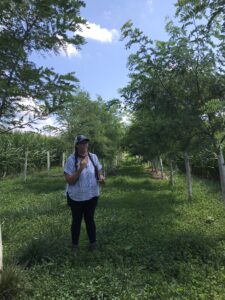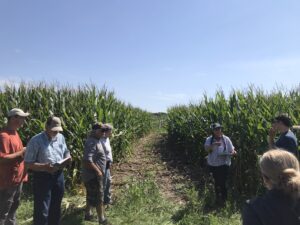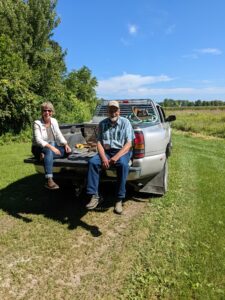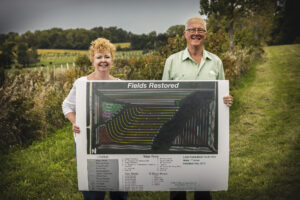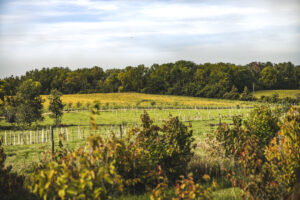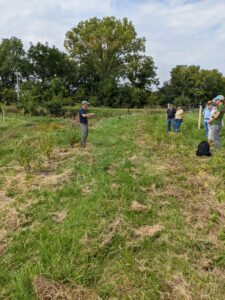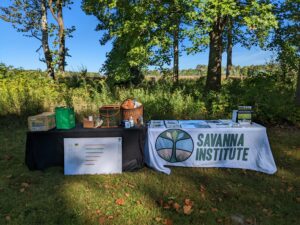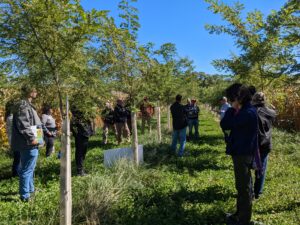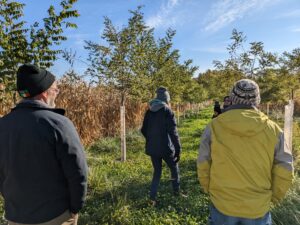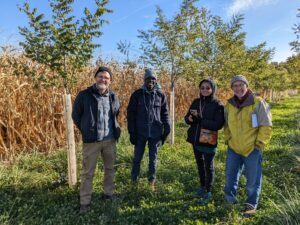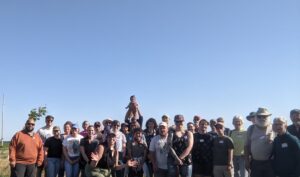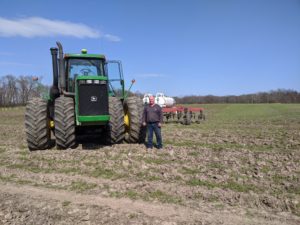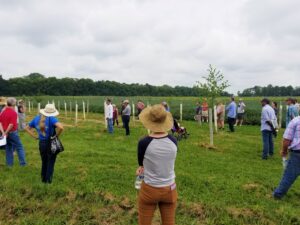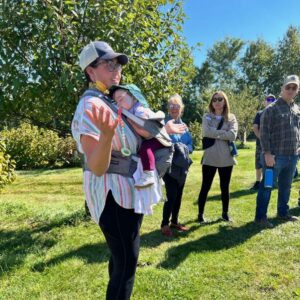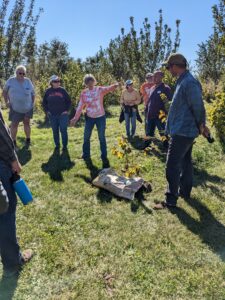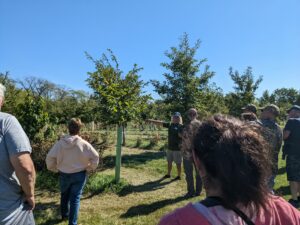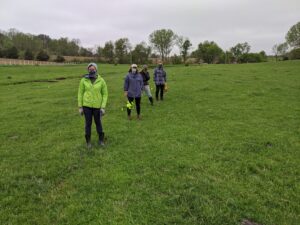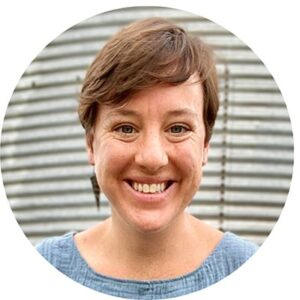Final report for LNC19-429
Project Information
Agroforestry, the integration of trees with crops or livestock, is a transformative solution to the ecological and economic issues of agriculture. A major hurdle to agroforestry adoption in the Midwest is the inadequate demonstration on a scale comparable to typical row-crop farms. Such demonstrations in Europe and Canada by universities and NGOs has greatly increased agroforestry adoption. From its inception, the Savanna Institute has worked with private, independent farms across the Midwest to demonstrate agroforestry. The effectiveness of this network has been limited by the fact that most farms are small, use inconsistent management, and often utilize only one of the many agroforestry practices.
To overcome these barriers and catalyze agroforestry adoption across the Midwest, the Institute launched a network of Institute-operated Agroforestry Research & Demonstration (R&D) Farms in 2019. In partnership with public and private landowners, these farms facilitate a broad range of decentralized education, demonstration, and research functions.
This project, “Establishing an Illinois Network of Agroforestry Research & Demonstration Farms” supported planning, establishment, and education at three R&D Farms in Illinois. At their core, each farm hosts commercial-scale demonstration plantings featuring a suite of agroforestry practices including multiple types of alley cropping, a multi-functional windbreak, edible riparian buffer, and cattle silvopasture. Adaptable and engaging educational signage and on-farm educational workshops provide multiple modes of engagement throughout the year. Direct oversight by the Institute ensures robust, science-based management and improves long-term economic and ecological monitoring beyond what is possible with a network of independent farms.
Since 2020, these agroforestry R&D Farms have served as invaluable education hubs for farmers, landowners, investors, policymakers, and the public. Increased familiarity with the profitability and ecological benefits of agroforestry has directly led to increased adoption of agroforestry, the launch of careers in agroforestry, deeper engagement with Savanna Institute partners including NRCS, Soil and Water Conservation Districts, Univerity of Illinois, and increased advocacy and partnership building to support tree-based farming systems. Increased agroforestry adoption and awareness in the North-Central Region is leading to long-term work on farm profitability, ecological resilience, carbon storage, water quality, and rural job creation among Savanna Institute and its partners.
LEARNING OUTCOMES
- Availability of R&D Farms as an educational asset for sustainable agriculture educators throughout Illinois.
- Recognition of agroforestry's profitability and ecological benefits by farmers, landowners, agricultural professionals, investors, and policy-makers.
- Application of agroforestry and perennial agriculture knowledge by beginning farmers
ACTION OUTCOMES
- Conversion of engaged stakeholders to agroforestry advocates in their communities
- Adoption of agroforestry by site visitors and trainees
SYSTEM CHANGE OUTCOMES
- Widespread adoption of agroforestry practices, diffusing across the landscape from R&D Farms
- Enhanced farm profitability, ecological resilience, carbon storage, water quality, and job creation
The Illinois Research & Demonstration Farms, launched during the beginning Covid-19 pandemic, has faced immense successes, roadblocks, and opportunities for future growth. 2020, the first year of the project, was a very challenging one. A delayed start to our work, ever-shifting logistics and measures to keep our staff and collaborators safe, and an inability to educate farmers, landowners, and ag professionals in person were significant roadblocks. But these situations also allowed us to dig deep into systems management, crew and partner education, and on-the-ground research.
While 2021 remained a challenge for education and outreach for the IL Agroforestry Research & Demonstration Farms, Savanna Institute was able to host a series of field days, expand establishment work on the ground, improve plantings and systems from the 2020 season, and deepen relationships with collaborators, farmers, and landowners. We also welcomed our second crew of interns, who brought enthusiasm, ideas, and hard work to each of the farms in this network.
The third season of Savanna Institute's Agroforestry R&D Farm network brought exciting milestones for on-the-ground work, the addition of a new R&D Farm, the loss of one original R&D farm, connection to new audiences, and collaboration with new farm partners. Also during this season, Savanna Institute launched our Agroforestry Technical Service Program, which supports farmers and landowners in planning, designing, and establishing agroforestry plantings on their own farm, and helped launch an Agroforestry Demonstration Farm working group, which created a community of practice for organizations and agencies wanting to build agroforestry demonstration farms.
During the last six months of this project, Savanna Institute completed educational signage across the three Research & Demonstration Farms, as well as three virtual tours that welcome visitors to the site and showcase the power of agroforestry, without having to travel to the farms themselves.
The Illinois Research & Demonstration Farms
4-H Memorial Camp
Allerton Park
Monticello, IL
Our Demonstration Farm at 4-H Memorial Camp is located at Allerton Park, a 1500-acre park in Monticello, IL owned by the University of Illinois. The Savanna Institute manages a 35-acre alley cropping demonstration farm that features rows of hardwood timber with alleys of annual row-crop rotation.
Fields Restored
Oregon, IL
Fields Restored is a privately owned, 166-acre farm featuring row crop, pasture, and agroforestry plantings. The Williams family first worked with the Savanna Institute to transition 20 acres to alley cropping in 2015, and current work includes a silvopasture experiment and riparian buffer to stabilize an eroded waterway.
Hudson Farm
Urbana, IL
Hudson Farm is a 120-acre farm near Urbana, IL owned by Cathe Capel that demonstrates a variety of windbreak designs for wildlife, wind protection, and profit. Hudson Farm also features hardwood timber and grain alley cropping, elderberry and hazelnut variety trials, and pollinator habitat. Hudson was the first major agroforestry installation launched in partnership with Canopy Farm Management, a tree-planting business started by the Savanna Institute in 2021.
Cooperators
- (Educator and Researcher)
Research
Education
The Savanna Institute Research & Demonstration Farms are education hubs for farmers and the public to learn about agroforestry. In addition, they provide a place where our scientists collect long-term data, host tree crop germplasm repositories, conduct variety trials, and show how agroforestry can be practiced within different regions. All demonstration farms are developed in partnership with public and private landowners and managed by the Savanna Institute to ensure robust, science-based design, fieldwork, and education around agroforestry, and to improve long-term economic and ecological monitoring.
The main educational components of this work include documentation and data collection during the planning, design, establishment, and maintenance of the farms, in-person field days and tours, online education through videos, photos, and presentations, long-term partnership building with farmers, landholders, organizations, and agencies through engagement with the R&D Farms, and supporting a community of practice for other organizations and agencies wanting to establish agroforestry demonstration farms on their own. During this project, education built slowly over time as the farms were established, partnerships were created, and on-the-ground experiences were documented.
Due to safety concerns and restrictions related to the COVID-19 pandemic, no public events were held in 2020, and no visitors were welcomed at the Demonstration Farms. While online educational events were seriously considered, it was determined by SI staff that remote education would not come close to replacing in-person field days, and lack of rural internet access could prevent many farmers from participating.
In 2021, we hosted 3 in-person field days (one of each of the three R&D Farms). These events focused on agroforestry basics, establishment and maintenance best practices, incorporation of native ground covers into farming systems, and sharing what was learned during the first year and a half of this program. Each of these events highlighted the landowners, farm partners, and other collaborators that contribute work, research, and insight to farm designs, establishment, and maintenance. Multiple Savanna Institute staff (including interns) were present at each event to answer questions, provide insight, and connect attendees to additional resources. By providing lunch during the events, we were able to continue networking between attendees, Savanna Institute staff, and our partners.
Each field day was advertised via personal invitation, social media, newsletters, and word-of-mouth by the Savanna Institute staff and partners in each location. Local agriculture and conservation organizations and agencies were also invited, not only to share information about their work but to engage and learn more about agroforestry. We welcomed a total of 111 attendees to the 3 field days hosted in 2021. A survey was shared with participants after each event to gather information on their experiences and the impact of the event. In addition to field days, IL Agroforestry R&D Farm Educator Kaitie Adams also presented on the IL Agroforestry R&D Farm network at multiple online events, as well as, welcoming small groups of funders, landowners, and farmers for smaller tours.
In 2022, we hosted 3 in-person field days (2 at Memorial 4H Camp and 1 at Field Restored). These events focused on agroforestry basics, establishment and maintenance best practices, planning and designing agroforestry systems, how trees can boost water quality, and sharing what was learned during the 3 seasons of this program. Each of these events highlighted the landowners, farm partners, and other collaborators that contribute work, research, and insight to farm designs, establishment, and maintenance. Multiple Savanna Institute staff (including our Illinois Technical Service Provider Sven Pihl and Ecosystem Scientist Nate Lawrence) were present at events to answer questions, provide insight, and connect attendees to additional resources. One thing that was really deepened this year was networking between participants that scratched far beyond these events.
Each field day was advertised via personal invitation, social media, newsletters, and word-of-mouth by Savanna Institute staff and partners in each location. Local agriculture and conservation organizations and agencies were also invited, not only to share information about their work but to engage and learn more about agroforestry.
We also hosted multiple small group tours of practitioners, funders, and clients of Savanna Institute's Technical Service Program, as well as participants in the IL Master Naturalist Conference. We welcomed a total of 179 attendees to the 3 field days and multiple tours hosted in 2021.
In addition to farm-based events IL Agroforestry R&D Farm Educator Kaitie Adams also presented on the IL Agroforestry R&D Farm network at multiple online events, as well as, invited people to visit the farms during field days and events at other farms, outreach events, and in-person presentations.
In the first six months of 2023, the R&D Farms were the focus of multiple events for farmers, technical service providers, and policymakers. These presentations included a workshop at the Illinois Organic Grain Conference, a series of presentations for the Univerity of Illinois Extension, a virtual farm tour for Senator Dick Durbin, 4 tours for University of Illinois Natural Resource undergraduate students, an Agroforestry Networking event, and multiple site visits with Soil and Water Conservation District Employees, Univerity of Illinois Researchers, and Savanna Institute partners. 2023 also saw the creation and installation of on-farm educational signage, as well as, three short, impactful videos that provided an overview of the three Illinois R&D Farms.
In addition to on-farm events, educational signage, and videos, Illinois R&D Farm Educator Kaitie Adams supported the launch of an Agroforestry Demonstration Farm Working Group, focused on how agencies and organizations can adopt agroforestry on their lands, and the Savanna Institute-based Agroforestry Technical Service Program, which supports private farmers and landholders in planning, designing, and establishing agroforestry.
Our main goal with all of these activities has been to use the R&D farms as "locations of possibility" where people can see agroforestry as something beautiful, transformational, and practical. Since the R&D Farms' launch in 2020, we've seen an increase in demand for tours and events on the farms.
Project Activities
Educational & Outreach Activities
Participation Summary:
In 2020, IL Agroforestry R&D Farm Educator Kaitie Adams presented on the IL Demonstration Farm Program at 4 total online conferences and invited talks. These were not part of the original proposal but became safe, viable platforms to present the practices utilized, research being conducted, and lessons learned at the 3 Illinois Demonstration Farms in 2020. These presentations reached a total of 1175 farmers, students, and agricultural professionals through online platforms.
Kaitie and 3 Demonstration Farm interns also presented an online farm tour of the Allerton Park Demonstration Farm. This online tour was sparsely attended, even with multi-platform promotion. There was one news media story, Bringing Agroforestry to Illinois, and one agricultural publication article, New demonstration farms in Illinois to showcase commercial-scale agroforestry, on the Illinois Agroforestry Demonstration Farm program published in 2020.
Through the establishment of the 3 Illinois Agroforestry Demonstration Farms (Allerton Park, Sun Dappled, and Fields Restored), we were able to more deeply educate our team of interns (4 total), Savanna Institute Staff (12 total), and our partner landowners, farmers, and collaborators (10 total) through fieldwork, regular socially distant meetings, and collaborative problem-solving. Working and educating the conventional farmers we worked with at Allerton and Fields Restored has created more space not only for collaboration but for greater buy-in and championing of these systems. And while intern education wasn't originally a core educational goal of this project, we intentionally created space and resources to educate interns more once we saw that we weren't going to be able to engage with the public as much.
Due to the constraints of in-person education, we were able to research, design, and establish an innovative ground cover experiment this season at the Allerton Park Demonstration Farm, as well as a silvopasture experiment at Fields Restored. The Allerton Park experiment compares two different ground covers: (1) a standard “orchard mix” of perennial rye, fescue, and dutch white clover, and (2) a native, short-growing native prairie mix from Pheasants Forever that is tailored to Illinois and the farm’s specific soil. Furthermore, for each ground cover, the experiment also tests three different ground cover/weed management strategies in the tree rows: (1) banded herbicide application, (2) plastic weed mats, and (3) mowing.
The Fields Restored silvopasture experiment seeks to understand the value of establishing “islands” (groupings) of trees into actively grazed pastures. These tree islands are common to pastures in Europe but have not been employed in the United States. This experiment includes two island sizes and five combinations of native trees and shrubs. This experiment seeks to explore how this silvopasture design can increase biodiversity, support wildlife and pollinators, produce a salable product, and provide shade and other benefits for livestock. These islands will be monitored by interns who will collect data and monitor livestock interactions.
There is almost no research on groundcover establishment and management in alley cropping systems or silvopasture islands; these projects address many of the questions we receive from landowners and farmers about best practices and options for tree cropping systems. Having to pivot some of this project’s focus has allowed us to allocate more time and resources to ensuring robust management and monitoring systems to better educate farms and landowners.
While there were still challenges to keeping people safe and healthy during the continuing Covid-19 pandemic in 2021, Savanna Institute was excited to host multiple in-person events on the Illinois Agroforestry Research & Demonstration Farms. Each field day was designed to highlight the important role partnerships between farmers, landowners, and other entities play in successful agroforestry design and establishment, the practical how-tos of incorporating trees into agricultural landscapes, a walking tour of the demonstration plantings, and one-on-one conversations with interested farmers and landowners. Partnerships played a key role in planning and outreach for each event. Savanna Institute staff and outside partners each reached out with personal invitations to landowners and farmers who might be interested in the event. The field days were also shared via Savanna Institute and partner social media channels, newsletters, and other in-person events. After the events, photos and takeaways were also shared via similar media and in-person channels.
We saw all three field days as successful in terms of attendance and the number of farmers and landowners who were actively looking for more information, resources, and support to establish agroforestry on their own landscapes. In the months following the events, the Illinois R& D Farm Educator, as well as, other Savanna Institute staff have worked with 10 total landowners who are looking to establish agroforestry practices on their landscapes in the next 2-3 years. During lunch at both Memorial 4H and Fields Restored Field Day, I had farmers and landowners share that they didn’t really know exactly how adding trees might look on their own farms until they attended the event and were able to ask questions and talk with SI staff and partners. This “see it to believe it” mentality showcases how important these demonstration farms are in increasing agroforestry adoption and were especially powerful during smaller group tours.
R&D Farm Educator Kaitie Adams also presented on the R&D Farm Program at 3 online conferences with both local and broader reach. Attendees at these three conferences were not only excited to learn about the work Savanna Institute was doing but also that there were farms designed and managed by Savanna Institute that people could engage personally with. At the North American Agroforestry Conference, attendees talked about ways that this model could be replicated in other locations by other organizations to make agroforestry more visible. While the focus of this project has been on the education of farmers, landowners, and agricultural professionals, we see immense value in also sharing our successes, failures, and systems with similar organizations wanting to launch their own demonstration farms.
In addition to in-person and online educational events, Savanna Institute also hosted 4 interns this season who worked across the IL Research & Demonstration Farm sites. These young people came to this work eager to learn and become vocal, articulate advocates for agroforestry across the season.
2022 saw two major changes in the IL R&D Agroforestry Farm Network occurred in 2023 that deepened our demonstration and education efforts. The first was the removal of Sun Dappled Farm in Hanna City, IL, and the addition of Hudson Farm in Urbana, IL.
During the 2022 season, tensions began to arise between Sun Dappled Farm’s landowner and the Savanna Institute related to site goals, in-field maintenance, and lease terms. At the launch of this network, the landowner was living out-of-state and had agreed, via a written MOU, that Savanna Institute has full access and decision-making at the site. During 2020, due to pressures from the Covid-19 pandemic, the landowner returned to the area, and Savanna Institute started working with her more closely to better learn the history of the site and incorporate some input on the site’s purpose and vision. In spring 2021, when the R&D Farm Educator shared field plans for 2022, there were disagreements in mowing schedules, pruning regimes, invasive removal, and planning/design work. Over the season, those disagreements became deeper as interns ran into issues successfully implementing plans on the site due to landowner intervention, even though Savanna Institute was given full access and decision-making via the MOU. In winter 2022, discussions began to try and negotiate changes to the MOU, site planning and design, and field maintenance plans to better balance Savanna Institute and the landowner's wants and needs. After multiple meetings with the landowners and multiple members of Savanna Institute staff, including SI’s Executive Director, it was mutually decided that Sun Dappled would be removed from the R&D network and Savanna Institute would no longer continue work on the site. As a gesture of goodwill, Savanna Institute left tree tubes and other supportive field infrastructure in place at the farm to ensure the continued growth and survival of the trees on site.
While the loss of Sun Dappled Farm was unfortunate, it allowed space for the addition of a new farm into the IL R&D Network. Hudson Farm is a 120-acre agroforestry demonstration farm located in Champaign country featuring a 10-acre windbreak and 100+ acres of annual and perennial alley cropping. Working in partnership with a local landholder, local row crop farmer, and USDA NRCS this farm boldly illustrates how transitioning row crop land to agroforestry can sink more carbon, boost soil health, improve water quality, build habitat, and diversify farm income.
The alley cropping systems at Hudson Farms feature conventional grains, hazelnut, elderberry, heartnut, pollinator habitat, and cover cropping. The windbreak showcases multiple designs to illustrate the different ways farmers and landowners can use windbreaks to help them reach their business and conversation goals. Hudson Farm is a prime example of how farmers and landowners can utilize historic USDA investment in climate-smart agriculture and innovate how agriculture can be a tool of resilience.
The second large change to the R&D Farm program was the contracting of Canopy Farm Management for fieldwork at the IL R&D Farms. Canopy Farm Management was launched in early 2022 to support the rapid expansion of agroforestry in the Midwest. Canopy was started as a for-profit arm of the Savanna Institute, and as such, Savanna Institute is part owner of Canopy and will be the recipient of any profits from the business.
Canopy’s services include precision tree planting, at-scale field maintenance technology, drone imagery for field record keeping and crop analysis, and a trained crew utilizing state-of-the-art technology specifically designed or modified for agroforestry and tree-based systems at any scale.
After 3 seasons of field intern hiring challenges due to low pay, location of work, and seasonality, the expansion of Savanna Institute’s Agroforestry Apprenticeship Program, in which apprentices often chose practitioner farms over SI sites, and multiple years of establishment and field work challenges due to non-scale appropriate equipment and materials, it was an easy choice to partner with Canopy Farm Management to support work at the R&D sites.
While Canopy completed fieldwork, R&D Educator Kaitie Adams created detailed maintenance plans and field schedules for each site, helped train Canopy staff on the background and goals of the R&D farms, conducted on-site inspections, and had Canopy staff present at education events throughout the season to answer any field-level questions.
This shift freed up capacity for deeper collaboration with partners, a focus on connecting people in the agroforestry planning and design process to the R&D farms via Savanna Institute’s Technical Service Program, better high-level decision-making, and the opportunity to expand the audiences we reach, including ag and conservation professionals and more general audiences.
Working with Canopy has also allowed us to demonstrate best practices for agroforestry establishment and management, including the integration of precision ag technology. This has provided us the opportunity to show the full spectrum and scale of work: from laying out designs with tape measures, string, and stakes followed by hand planting trees to laying out designs in GIS and planting via GPS-guided planters.
These two major changes to the R&D program were incorporated into all of our educational events, in-person and online during the past year and created fruitful conversations and collaborations. The exciting thing about agroforestry is that, even though it’s a long-term practice, there are an unlimited number of ways for these systems and the way we do this work, to adapt, shift, and change. As farmers, landowners, and those who support them face uncertain futures of weather, markets, and support systems, this adaptability and innovation is key.
In the first 6 months of 2023, Savanna Institute deepened our education and outreach work through the IL Research & Demonstration Farm Network by shifting focus on how to grow and deepen learning and on-farm connection into the future. Utilizing footage from the 2022 growing season, R&D Farm Educator Kaitie Adams worked with Man Alone Media to create 3 virtual farm tours that allow people from around the world to learn about the 3 Agroforestry R&D Farms located in IL. These videos are also supported by thousands of professional and non-professional photos taken by staff and visitors that show how each farm has grown and progressed since its establishment. Since their launch, over 1,000 people have viewed them. These videos will also be part of a larger outreach effort throughout the state of Illinois to engage new audiences in the power and possibility of agroforestry.
Savanna Institute staff also created a suite of on-farm educational signage that was designed to be adaptable, mobile, and utilized across farms in multiple contexts. In our initial proposal, we planned on designing and installing 10 large educational, interpretive signage installations at each of the 3 R&D, plus additional smaller signage/markings distributed throughout the demonstration plots. However, it became clear by the end of 2022, that permanent signage would not be the best educational tool due to changes in access allowances from our landholders and the evolving nature of the farm's planning and design. To address these changes, the R&D Farm Educator worked with Savanna Institute's Communications Team to design, order, and install 9 crop overview signs (Elderberry, Black Currant, Hazelnut, Chestnut, Heartnut, Black Locust, Black Walnut, Persimmon, Mulberry) 5 agroforestry practice overview signs (Alley Cropping, Windbreak, Riparian Buffer, Silvopasture, Forest Farming), 3 farm-overview signs (Memorial 4H Camp, Fields Restored, and Hudson that include interchangeable signs allowing for frequent updating), 2 portable agroforestry fact signs, 3 farm welcome signs, 2 encased bulletin board signs to host maps and visitor information, 275 small signs (that include interchangeable signs allowing for frequent updating)for labeling practices, spacing, and species in-field, and assortment of other small signs for welcoming and educating visitors. All of these signs, except one, are not permanent, which means as the farms change and transform over time, these signs will be able to move from place to place, never making them out of date or obsolete.
These signs debuted during our most recent field tours and events with lots of positive feedback on their clear educational content and beautiful illustrations and photographs. Savanna Institute plans to add signs to the collection as work progresses on the farms.
In addition to on-farm events, educational signage, and videos, Illinois R&D Farm Educator Kaitie Adams supported the launch of an Agroforestry Demonstration Farm Working Group and an Agroforestry Technical Service Program. Although the Illinois R&D Farms are still in their first few years of growth, Savanna Institute and their partners saw a huge demand and need for peer-to-peer learning to support other organizations wanting to do something similar. Part of the US-wide Agroforestry Coalition, the Demo Farms working group brings together people who are starting, growing, managing, and/or interested in learning about agroforestry demonstration farms. Demonstration farms implement and experiment with agroforestry practices with a mission of educating growers and the public about agroforestry. Earlier this year the demo farms working group identified a need for a database of existing demo farms, so that demo farm managers, farmers, and other interested agroforestry advocates could more easily find each other. They are now in the process of building and launching a survey tool to collect information from demo farms to populate the database (and hopefully an interactive map).
The Savanna Institute's Agroforestry Technical Service Program, launched in 2022, provides one-on-one technical support for adding trees to your farm. Launched during a time of historic investments in agroforestry by the US Department of Agriculture, the TSP program was developed to meet growing demand from farmers exploring options on how to integrate trees on their farms. Savanna Institute’s Technical Service Program helps them take advantage of resources available to plant trees to support pastures, fields, and waterways. Technical Service Providers offer one-on-one support for planning, designing, and securing financial assistance for agroforestry systems. The Illinois R&D Farms have been foundational in the creation of this program, as the farms have provided spaces for TSPs and their clients to learn best practices in planning, design, and maintenance for agroforestry. Field days and on-farm workshops also created powerful spaces for current and future TSP clients to see practices firsthand, ask hard questions, and connect with other farmers and landholders adopting agroforestry.
Future work for education and outreach through the R&D network includes an expanded suite of on-farm workshops and trainings, as well as opportunities to host farmer and landholder networking events. The farms will also be utilized for connecting online educational resources to on-the-ground work through a successive NCR SARE grant entitled "Novice-to-Producer Agroforestry Education: Linking Demonstration Farms to Online Learning and Communities of Practice". Savanna Institute is also planning a strategic expansion of the R&D Network with expanded staff capacity, connection to private agroforestry demonstrations, and a distributed network of field-based research.
Learning Outcomes
- Perennial groundcover establishment and care
- Silvopasture
- Riparian Buffers
- Windbreaks
- Alley Cropping
- Balancing Conversation and Profit in Agroforestry Systems
- Tree Planting
- Agroforestry Establishment Best Practices
- Agroforestry Design
- Financing for Agroforestry
- Tree Crop Selection
- Nutrient Management
- Pollinator Habitat
- Integrated Crop and Livestock Systems
- Carbon Sequestration
- Habitat Enhancement
- Plastic Mulch
- Precision Herbicide Application
- Networking
- Partnership Building
- Water Quality
- Soil Health
- Long-term Lease Structures
- Access of NRCS Programs for Agroforestry
- Education of Conservation + Ag Professionals
Project Outcomes
Alley Cropping
Silvopasture
Riparian Buffer
Windbreak
2020
The farmer who rents the alleys for conventional row-crop production (this year’s rotation is corn) at the Allerton Park Demonstration Farm came into this project very skeptical. In our initial meetings, he had some trouble (1) understanding why we would want to plant trees on agricultural land, (2) seeing how his equipment would function efficiently within this system, and (3) trusting an organization he was unfamiliar with. But, like most farmers of any scale or practice, he quickly began to understand once we got in the field. The day we finished flagging out the borders of the tree paddocks using GPS, he began his first field preparations of the year. After the first full pass, he got out of the tractor and exclaimed “Hoo, girl. Those rows are perfectly straight!” with a huge smile on his face. After that, I knew we were going to have a good working relationship and would be able to work through any issues that arose; he saw Savanna Institute as an organization that could do the work well and put talk into practice, as well as alley cropping as a practice that fits well with his systems.
2021
The Memorial 4H Camp Alley Cropping Field Day was a huge success, in part, thanks to the presence, perspective, and honesty of our partner farmer, who subleases the alleys between trees for row crop production, and our partners at the Memorial 4H Camp, who are the lease beneficiaries and neighbors to this site. Because the field day was attended by multiple row crop farmers and landowners, there were lots of questions not only about design but how row cropping could be successful with “trees in the way.” Near the beginning of the tour, a farmer attendee asked our partner farmer what he had to change in order for this system to work. To which he replied simply “Nothing..” Then the follow-up question came, “Okay. But how did it affect yields?” Our partner farmer replied, “It didn’t. In fact, we had a great corn year and saw higher yields.” With those statements, IL R&D Farm Educator Kaitie Adams felt a noticeable shift in mood, especially with the row crop farmers and landowners in attendance. They started to ask even more detailed questions that showed they were starting to work through how alley cropping might look on their own landscapes. And while Kaitie was quick to point out that bumps in yield probability didn’t have that much to do with the trees after one year of establishment (but they would in following years), the impact of the partner farmers' words remained powerful.
2022
On a beautiful early October morning, agroforestry farmers Mark and Tammy Allen welcomed over 30 local producers, neighbors, and agroforestry-curious people to their farm in Argenta, IL for a farm tour and perennial potluck. Their 10-acre farm features over a dozen different species of perennial fruits and nuts, high tunnel fruit and vegetable production, mushrooms, bees, and a beginning propagation and value-added production business. As we walked the farm, we tasted late-season fruits and vegetables, learned about their innovative multi-species design, and marveled at their solutions to common in-field issues like trunk rub from tree tubes and predation from small mammals. After the walk, participants enjoyed shared dishes on pawpaw cheesecake, apple and honey slaw, roasted chestnuts, fruited drinks, and other dishes featuring perennial produce.
This event was the direct result of connection and networking at the alley cropping field day at Memorial 4H Camp the September before when Mark and Tammy invited everyone out to visit their farm. After the alley cropping field day, R&D Educator Kaitie Adams followed up with the Allen's, help plan the event, and personally reached out to the folks who attended the September event, as well as, other current or beginning agroforestry producers in the area. It's been exciting to see other farmers take on education and mentor roles within their community and invite Savanna Institute and our R&D Farms to be central hubs of connection.
2023
During the past three years, Savanna Institute has experienced a rapid increase in demand for our education and technical assistance programs in Illinois and the greater Midwest. To meet that demand, we have rapidly increased our staffing, including the hiring of 4 Technical Service Providers that can serve the state of Illinois. During our most recent hiring rounds, Meredith Stamberger was hired as a TSP. Meredith first got involved with Savanna Institute as an intern helping establish the R&D Farms in Illinois. When she joined the crew in 2020 Meredith already had a strong background in agriculture, as she had studied production horticulture at Southern Illinois University and managed small vegetable farms. After her season as an intern, Meredith worked for her local Soil and Water Conservation District where she assisted growers in overcoming barriers to incorporate new conservation practices and perennial crops and started a small farm business that includes perennial cropping and agroforestry. Meredith's path from learner to advisor was greatly deepened by her experiences on the R&D Farms and she continues to bring that learning to bear in her work with farmers and landholders wanting to adopt agroforestry.
Immense gratitude for the support of this work. We've learned an incredible amount over the course of this project and am excited to continue to build knowledge, power, and connection on the Illinois R&D Farms!
